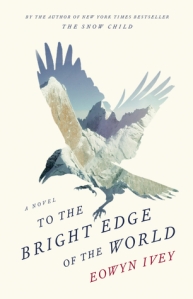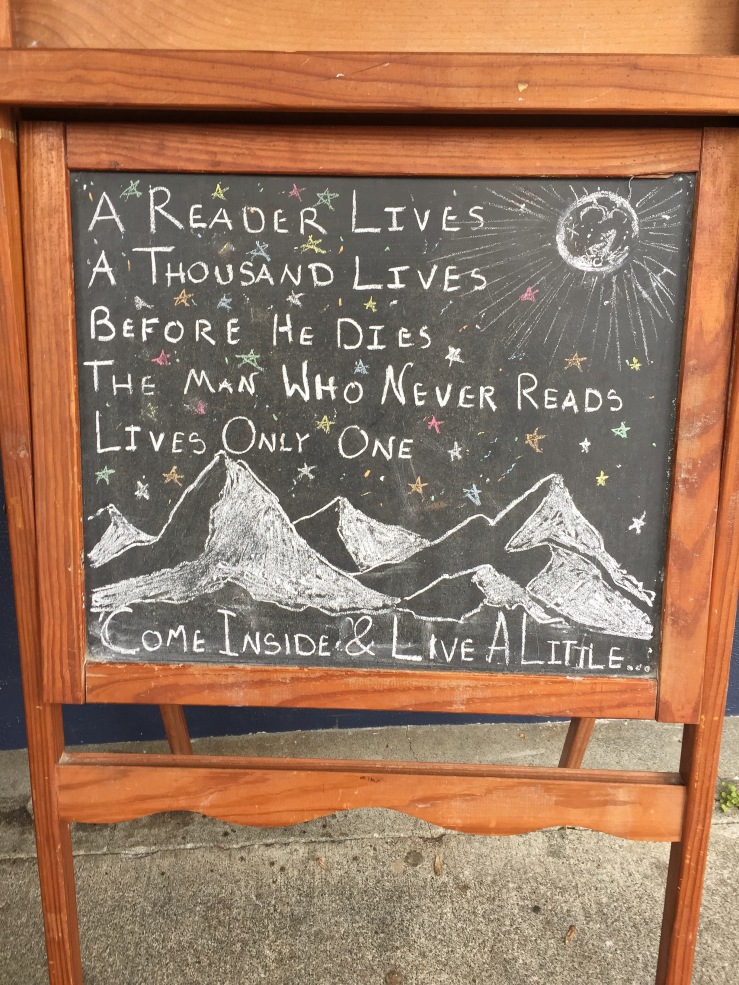Have you heard about Bookriot’s Read Harder Challenge?
I thought it would be interesting to see which books I’ve read in these categories, since Ann Patchett just wrote about her own progress in making her way through the list.
I’d love to hear what you’ve been reading, too, so let us know in the comments. Book suggestions are appreciated and welcome, especially for those categories I’ve left blank.
 By the way, Ann just released her new novel, Commonwealth. Many of you know she’s one of my favorite novelists, so I’ll be sure to get my hands on it as soon as I can.
By the way, Ann just released her new novel, Commonwealth. Many of you know she’s one of my favorite novelists, so I’ll be sure to get my hands on it as soon as I can.
True story, when Ann was a girl, one morning she woke up to find kids she didn’t know in the kitchen. Turned out, her mother had gotten remarried, and these were her new half siblings.
Ann has translated some of that strange family experience into a novel that isn’t, literally, a true story, but that I imagine has plenty of emotional truth, as writers of fiction often say about their work.
If you’re looking for other suggestions, check out the New York Public Library’s Read Harder recommendations. See also the reader-generated lists on Goodreads.
If I’ve left the category blank, it means I haven’t read that category and don’t have any particular suggestions. If you do, please let us know.
BOOKRIOT’S READ HARDER CHALLENGE 2016
Read a horror book
Read a nonfiction book about science: Lab Girl, by Hope Jahren. (I’m reading it now). It has gotten excellent reviews, a memoir about a female scientist. It’s an eye opener, in part about what women in science are (still) up against, but there’s a lot more to this memoir about a woman passionate about plants.
I just borrowed Half-Earth: Our Planet’s Fight for Life, by Edward O. Wilson from the library. Nearing the end of his life, Wilson felt compelled to sound the alarm once more. He proposes that we devote half the surface of the earth to nature.
 Read a collection of essays: Queen of the Fall, by Sonja Livingston; and Why We Write About Ourselves, edited by Meredith Maran.
Read a collection of essays: Queen of the Fall, by Sonja Livingston; and Why We Write About Ourselves, edited by Meredith Maran.
Read a book out loud to someone else: The Harry Potter series; The Giver; and Hatchet. Not this year, but when our sons were growing up, these were unforgettable read alouds. Harry Potter is especially captivating read deep in the woods at night when you’re camping.
Read a middle grade novel: see above, none this year for me.
Read a biography (not memoir or autobiography): Charlotte Bronté: A Fiery Heart, by Claire Harmon is on my to-read list. See the feminist category below.
 Read a dystopian or post-apocalyptic novel: The Buried Giant by Kazuo Ishiguro, and Find Me, by Laura Van Den Berg. I read everything by Ishiguro. The latter novel by Van Den Berg was well reviewed and is excellent, though it didn’t really speak to me.
Read a dystopian or post-apocalyptic novel: The Buried Giant by Kazuo Ishiguro, and Find Me, by Laura Van Den Berg. I read everything by Ishiguro. The latter novel by Van Den Berg was well reviewed and is excellent, though it didn’t really speak to me.
Read a book originally published in the decade you were born: I’ve been wanting to re-read Australian Neville Shute’s chilling dystopian novel, On the Beach. His A Town Like Alice blew me away in 1981 as a 5-hour Masterpiece Theatre production, and I would love to watch it again. (It’s only available on VHS.) I don’t believe I ever read the book.
Listen to an audiobook that has won an Audie Award:
The Bully Pulpit: Theodore Roosevelt, William Howard Taft, and the Golden Age of Journalism, by Dorothy Kearns Goodwin. OK, I haven’t read this book or even listened to it, but I gave it as a gift to a friend who loves Teddy Roosevelt. It won an Audie in 2015 for the best History/Biography category. This would qualify for the over 500 pages category, too, which is reason enough to listen to the audio version. I should read this or listen to it, considering that I believe journalism today is in a sorry state.
There is an Audie Classic Category, which I didn’t know about but just may entice me to finally start listening to audio books. Here’s a suggestion that sounds intriguing, also an Audie award winner: The New York Stories by John O’Hara.
I will try audio books soon, but I resist them. I don’t want to constantly fill my head with media, I need plenty of silence to think and to let my own writing germinate.
I’ve read and hear often that print books will disappear. Some people announce this with a great deal of glee, and I don’t understand why. Can we have both? Why does it seem to make some people happy that print books may disappear?
 Read a book over 500 pages long: Elena Ferrante’s Neapolitan Novels. I’m counting this as a long read, even though there are four in the series. Had a great discussion about these books in a book club attended by many Italian-American women. One day I’ll read her other novels, which I’ve heard are rather devastating.
Read a book over 500 pages long: Elena Ferrante’s Neapolitan Novels. I’m counting this as a long read, even though there are four in the series. Had a great discussion about these books in a book club attended by many Italian-American women. One day I’ll read her other novels, which I’ve heard are rather devastating.
Read a book under 100 pages: Tribe, by Sebastian Junger. (130 pages, close enough)
Read a book by or about a person that identifies as transgender: Middlesex, by Jeffrey Eugenides, one of my favorites. Read this a few years back, superb.
Read a book that is set in the Middle East
Read a book that is by an author from Southeast Asia
 Read a book of historical fiction set before 1900: To the Bright Edge of the World by Eown Ivey; De Potter’s Grand Tour, by Joanna Scott.
Read a book of historical fiction set before 1900: To the Bright Edge of the World by Eown Ivey; De Potter’s Grand Tour, by Joanna Scott.
Read the first book in a series by a person of color: Not a series, but this year I read and loved Ta-Nehisi Coates’ Between the World and Me, and his memoir, The Beautiful Struggle.
Read a non-superhero comic that debuted in the last three years: This book is older than three years–I picked up Fun Home: A Family Tragicomic, by Alison Bechdel, but didn’t finish it. I may get back to it someday. It’s becoming a classic.
Read a book that was adapted into a movie, then watch the movie. Debate which is better:
I did see the movie, Brooklyn, by Colm Toibin, but didn’t read the book, don’t plan to. The movie was pretty good, mostly because of the acting, otherwise predictable.
I also saw this year the movie Carol based on the novel, The Price of Salt, by Patricia Highsmith. I thought it was excellent, haven’t read the novel. I was flabbergasted when someone I know said the main character in the movie was a predator. That is not how I interpreted the character in this movie about a lesbian relationship in the 1950s. I saw her as sympathetic. If anyone else has seen the movie and can comment, I’d love to hear your thoughts. I felt the predator comment revealed perhaps unconscious LGTBQ bias; but then again, Highsmith’s novels have disturbing characters. Perhaps the actual novel was darker, and some of that came through in the movie?
Read a nonfiction book about feminism or dealing with feminist themes:
My Life on the Road, by Gloria Steinem is a big bio this year, though I haven’t read it. I HAVE read, this year, and in the case of Bronté’s novel, many years in the past: Jane Eyre’s Sisters, by Jody Gentian Bower and Jane Eyre. These, because my memoir has a Jane Eyre theme. Last year I read Bad Feminist by Roxane Gay. Fabulous.
Read a book about religion (fiction or nonfiction): After Buddhism, by Stephen Batchelor. (On my to-read list)
 Read a book about politics, in your country or another (fiction or nonfiction): 67 Shots: Kent State and the End of American Innocence, by Howard Means. This one is personally meaningful.
Read a book about politics, in your country or another (fiction or nonfiction): 67 Shots: Kent State and the End of American Innocence, by Howard Means. This one is personally meaningful.
Read a food memoir: On my to-read list is Blue Plate Special by Kate Christensen. Classics I love are Laurie Colwin’s food memoirs. Elizabeth David was a superb food writer, though her books aren’t really memoirs. Ruth Reichl has come out with a new food memoir this year that I haven’t read, My Kitchen Life: 136 Recipes that Changed My Life.
Read a play
Read a book with a main character that has a mental illness: A Common Struggle, by Patrick J. Kennedy. This is a memoir. I also read the riveting memoir, A Mother’s Reckoning. The Eagle Tree by Ned Hayes is fiction, and it’s absolutely great.
Here’s a smidgen of The Masterpiece Theatre version of A Town Like Alice.
Have you read any books in these categories, or do you have any suggestions? Are you following the Read Harder challenge? Let us know in the comments.

 In
In 









